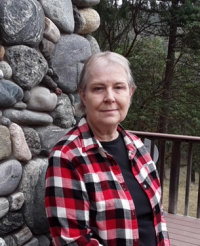

Surprises can be very nice. When the surprise is medical, however – you think that you have a problem with frequent urination for example, but the diagnosis is ovarian cancer – it is a shocker. I had already gone through a lumpectomy and radiation for breast cancer eight years prior to my ovarian cancer diagnosis.
It was 2013, and I was trying to lose weight and get into shape for my oldest daughter’s wedding. It seemed that my stomach just kept protruding, and I had to urinate frequently. When a new specialist, a urological gynecologist, joined the staff of a local hospital, I made an appointment. After a pelvic exam the doctor said that she felt something and wanted to schedule an ultra-sound. My medical appointments stopped at this point since I needed to travel to Quebec for the wedding. The wedding was beautiful! However, during the trip I was uncomfortably bloated and ready to get home for the test.
The ultra-sound was performed under anesthesia. My husband, who from this point on became my #1 support person, and I saw the very serious look on the gynecologist’s face. I said, “It isn’t good, is it?” She replied that she had seen a large mass and that I needed to see an experienced gynecologic oncologist in Portland as soon as possible. We were in Portland within a week, hoping that the surgery would take place immediately, but it was put off for another 2 weeks. The surgeon said that it was time to “put my affairs in order” and be prepared for an extended hospital stay due to the invasive nature of the surgery. We both were stunned that the mass was cancer but hopeful for the best.
The five hour drive back to Applegate was long, but it gave us time to make some decisions. Thankfully, family and friends had stepped in to help take care of our home and manage our property and animals.
The surgery took over six hours and had the rather unattractive name of “debulking.” I had a total hysterectomy; part of my bowel was removed along with all visible tumors and apparently everything else that wasn’t absolutely necessary. The hospital recovery was slow and painful. Thank goodness the U.S. Open tennis matches were playing, and I had beautiful fall scenery to look at from my hospital room at Good Samaritan Hospital.
After nine days in the hospital we headed home to rest, heal, and pull our thoughts together. Within a few days I had an appointment with my local medical oncologist and heard the news we had dreaded. Cells in the fluid in my lungs were diagnosed as cancerous. I had stage 4 ovarian cancer. Since my health generally had been very good, the oncologist said that she would prescribe aggressive platinum-based chemo. Two of my daughters came to help for a few days, and my husband helped me non-stop. In some ways, it felt best not to think too much about the diagnosis. Sometimes I take unpleasant thoughts and “throw them in a closet and slam the door.” In my mind this works for a while.
For the first few days after each infusion I experienced a relative lack of side effects from the chemo, probably because of the steroids that were part of the chemo protocol. But within a few days, nausea and diarrhea occurred for 4-5 days. It was not, however, so serious that I ever had to go to the emergency room. Being overweight prior to the surgery was a benefit as I lost 60 lbs. prior to the end of the aggressive chemo. Calories were my friends. I lost my hair, eyebrows, and had neuropathy in my feet. The neuropathy ended my decades-long tennis hobby and affected my balance.
I welcomed the chemo – I was glad there was an arsenal of medicines out there to help me. During chemo I had genetic testing and was found to have the BRCA2 mutation. Family members were tested, and my younger sister, brother, a niece, and father were also found to be positive for BRCA2. Other family members were found to be negative.
After two rounds of chemo, my CA 125 started to increase, and I was put on infusions of Avastin, which took the CA125 number down. However it lost its effectiveness in less than a year.
Currently, I take an oral chemo, a PARP inhibitor called Lynparza, which I have now been on for over two years. There are no obvious side effects other than a sloth-like metabolism. CA 125 numbers are staying in the teens, and scan results show no disease progression.
I am grateful for the love and support that family and friends have given me. It has helped me focus on the many positives in my life and has helped me be more patient and provided hope for more years.
My husband remains a steadfast partner in all ways. He has helped me keep my strength, courage, and sense of humor throughout the post-diagnosis years. He holds the ladder as I continue the climb. I have received excellent medical care and treatment by doctors and their staffs, all of whom have managed to be skilled, compassionate and realistic.
My gynecologist, my gynecologic oncologist, and my medical oncologist had told me that my diagnosis was dire and that affairs needed to be put in order. We took care of those issues, and we continue on our journey over six years later.
